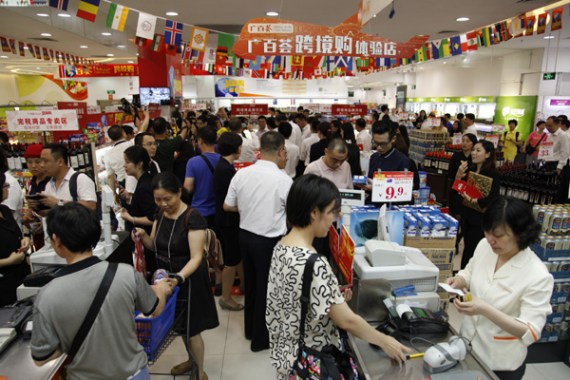| « China's campaign to simplify administration encourages foreign investors | Ctrip buys eLong stake » |
Retailers take online route to keep e-commerce firms at bay

Customers browse bonded products at a Guangzhou Grandbuy store. The company, the largest department-store chain in the city, has opened cross-border e-commerce experience sections in three stores that adopt the online-to-offline mode.
Every retailer in China wants a piece of the growing cross-border e-commerce pie. Department stores are no exception, and they see the sector as a promising avenue of transformation in the era of online shopping.
Guangzhou Grandbuy, the largest department-store chain in Guangzhou, capital city of Guangdong province, opened cross-border e-commerce experience sections in three stores on May 15 that adopt the online-to-offline mode, which is "experience in store, purchase online".
People can browse a display of bonded goods in the experience section with help from shopping guides and place orders on gbhui.com, Grandbuy's e-commerce platform, in the store or at home.
"Most customers are not familiar with foreign goods so there is a great need for offline experience stores in cross-border e-commerce," said Liang Hailing, general manager of the e-commerce department of Guangzhou Grandbuy.
Display sites for bonded goods are springing up across the country.
Seven such centers, including the three at Grandbuy, have opened in Guangzhou in the past month.
Similar centers have been set up in Dalian, Liaoning province and Chongqing municipality.
About 100,000 people made reservations to visit Guangzhou's largest shopping and display store for bonded goods, located in the Nansha Free Trade Zone, during the three days after it opened on May 1, according to the Information Times.
But it is unclear whether the store can continue to draw crowds, since it is at least an hour's drive by car or 90 minutes by subway from the city center.
Department store chains with many branches have an edge in terms of sales channels, convenient locations and after-sales service, according to Liang from Guangzhou Grandbuy.
"What we are doing is to open cross-border e-commerce experience stores 'on customers' doorsteps'. Grandbuy has 26 stores, which are its biggest resource to achieve the goal," Liang told China Daily.
The company's first three cross-border e-commerce experience sections are located in bustling shopping areas and convenient to visit by using public transportation. The retail giant will expand its cross-border e-commerce business to all its 26 stores in the coming two to three years, it said in a recent press release.
Customers can return unsatisfactory goods to the department store and get refunds, without the need to apply online and re-ship the goods to overseas sellers.
"Cross-border e-commerce is still new to many Chinese customers and department stores are a familiar and reliable platform for them to embrace the new shopping mode," Liang said.
"Cross-border e-commerce and traditional e-commerce target different consumer groups. Those who will spend on imported goods ... are middle-and high-end customers, a group that largely overlaps with department stores' regular customers."
Scenting a business opportunity, department stores in China have dipped their toes in cross-border e-commerce one after another.
Chongqing Department Store launched its cross-border e-commerce platform in September last year and opened an offline experience store a month later.
Department stores in Guangzhou, where cross-border e-commerce accounts for 70 percent of the country's total, have also shown strong interest. The Guangzhou Friendship Store and Guangzhou Grandview are also preparing to launch such stores, according to Guangzhou Daily.
"Department stores in China are embracing the O2O?online-to-offline?business mode to address the challenge from online shopping. Launching cross-border e-commerce experience stores is one way to meet the challenge," Gordon Lam, general manager of the southern China office of Li & Fung Development (China) Ltd, told China Daily.
"However, they should be careful and not just follow the trend. They need to make a careful review of their supply chain and logistics arrangements to avoid competition between bonded and duty-paid goods as far as possible and ensure efficient delivery."